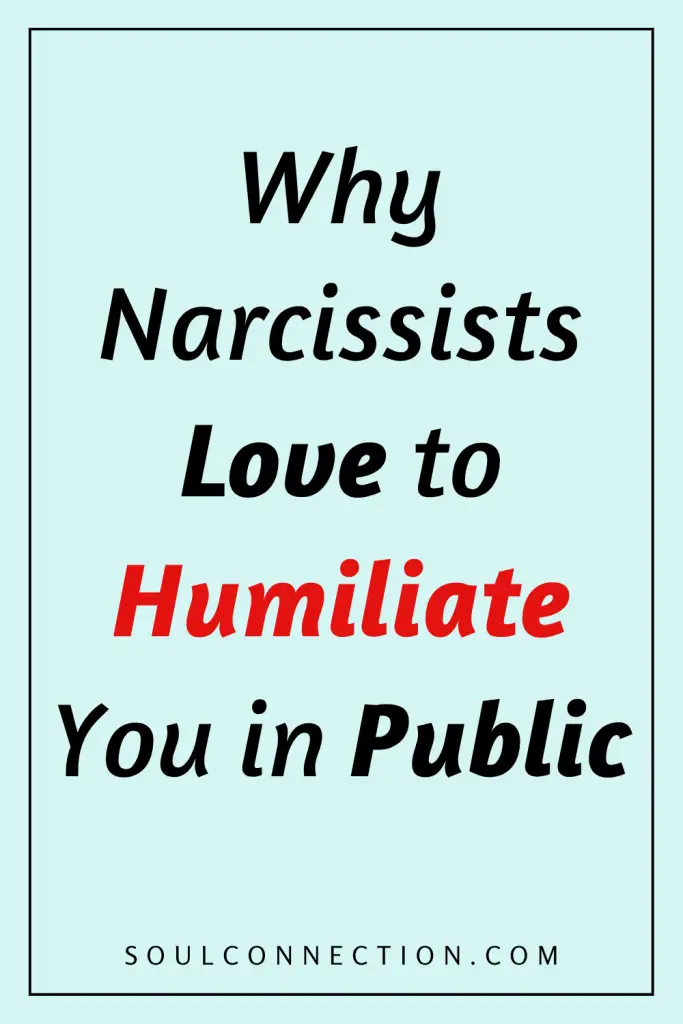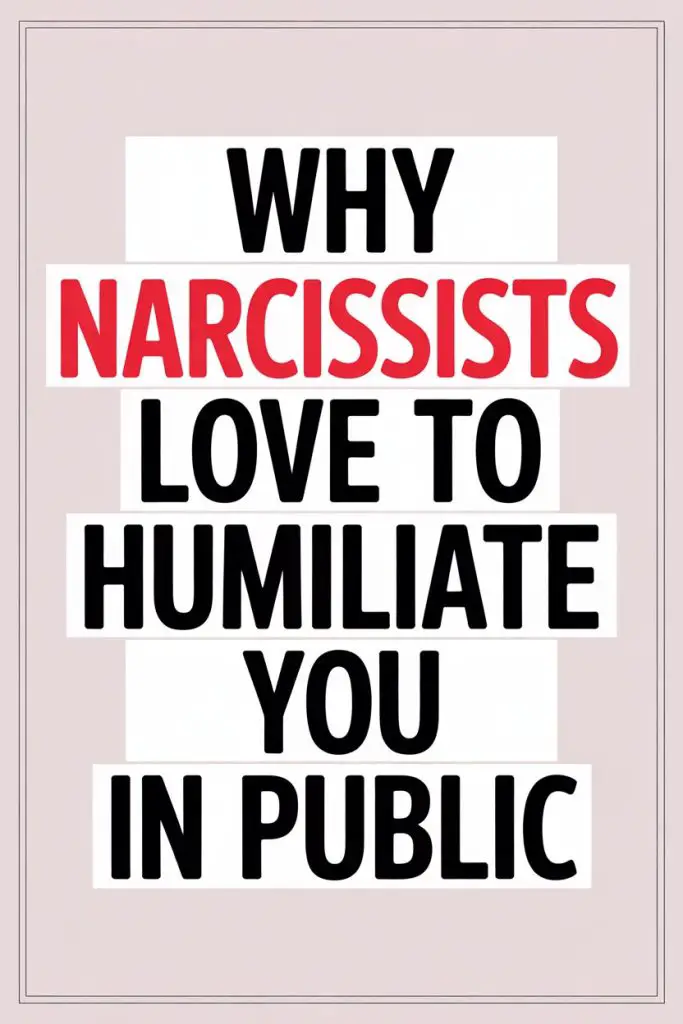Nothing quite takes the wind out of your sails like being put down by someone you love—especially in front of an audience. If you’ve ever caught yourself replaying a public jab or hurtful “joke,” you’re not alone.
Narcissists have a knack for turning public spaces into their personal stage, and humiliation is their performance piece. Why? What’s really going on behind that spotlight?
Let’s step behind the curtain and see what drives this all-too-common behavior.
The Narcissist’s Need for Control
At the heart of public humiliation is control. Narcissists don’t just crave it—they’re practically allergic to anything less.
By putting you down in front of others, they tip the social power balance in their favor.
It’s a way to remind you (and everyone else) who’s in charge, even if it’s just over who forgot to buy milk. Your embarrassment, their power surge.
Here’s the kicker: this isn’t always about the actual incident.
The public aspect magnifies their feeling of dominance. It’s a public display of “See? I’m superior.” The more flushed or flustered you become, the more they thrive.
Audience Participation Required
Narcissists adore an audience like a moth loves a porch light. Humiliating you in private might scratch their itch for a moment, but real satisfaction comes from having witnesses.
The audience serves two purposes. One, it provides validation—if people laugh or nod, the narcissist feels justified (never mind if people are just being polite). Two, it isolates you.
Public humiliation can make you feel unsupported and alone, even in a crowd.
Ever noticed how their “teasing” gets sharper when friends or family are around? That’s no accident. The more people watching, the bigger the ego boost.
When “Humor” Goes Rogue
Sarcasm and “just joking” are standard-issue tools in the narcissist’s arsenal.
You might hear: “I was only kidding! You’re so sensitive.” It’s the perfect camouflage for an insult. If you object, you’re accused of not being able to take a joke. If you don’t, you’re left nursing the bruise in silence.
This kind of humor leaves you doubting your instincts. Was it really that bad? Is it just me? Spoiler: No, it’s not just you. The joke is usually at your expense, with the added bonus (for them) of plausible deniability.
Eroding Your Confidence
Public humiliation isn’t just about a momentary win. It’s a longer game aimed at chipping away your self-worth.
Each jab, each mocking comment, makes you a little less likely to stand up for yourself. Over time, you may become quieter, more withdrawn, less willing to express opinions.
This suits a narcissist just fine—they prefer partners who don’t rock the boat.
They’re not seeking an equal partner; they’re building a fan club. The less confident you feel, the easier it is for them to keep the spotlight.
The Mask of Charisma
Here’s what makes public humiliation especially sinister: narcissists are often charming in groups.
Everyone else sees the witty, charismatic jokester. You see the other side—the one that takes “banter” a few steps too far. When you try to talk about it later, you might even hear, “But everyone thinks I’m hilarious!”
This leaves you second-guessing your reality. If others don’t see the harm, are you overreacting? Nope. The charisma is just a mask; the cruelty is real.
Shifting Responsibility
Narcissists rarely take the blame for anything, much less for humiliating you.
They’ll insist you “made them do it” by being too sensitive, not laughing, or not playing along. If you try to discuss your hurt, the conversation gets flipped—now you’re the one with the problem.
This tactic, known as gaslighting, keeps you off-balance and constantly questioning yourself. It’s exhausting, and that’s the point: a confused partner is a controllable partner.
Testing Your Boundaries
Every public put-down is also a test.
Narcissists want to see how much you’ll tolerate. Will you call them out in front of others? Will you stay silent?
The more you let slide, the more they push. It’s like giving them a blank permission slip for future misbehavior.
Boundaries are kryptonite to a narcissist. If you set them—especially in public—you may see a dramatic reaction. But letting things go will only invite more of the same.
Reinforcing Their Narrative
Narcissists are master storytellers, and you’re often cast as the comic relief or the “problem” partner.
Public humiliation helps reinforce the story they want others to believe: that you’re difficult, uptight, or just not as clever.
This sets the stage for future manipulation—if you ever try to speak up, they’ve already planted seeds of doubt about your credibility.
It’s like playing chess while they stack the board.
Practical Strategies for Handling Public Humiliation Tonight
Enough theory. If you’re dealing with a narcissist who loves to showboat at your expense, here’s how to disrupt their routine and reclaim your dignity—tonight.
Stay Calm, Cool, and Unimpressed
Nothing throws off a narcissist like failing to get a reaction. Keep your face neutral, resist the urge to justify or defend, and don’t rise to the bait.
You may want to scream into a pillow later, but in the moment, think poker face.
Name It—Briefly and Boundaries-First
A simple, direct statement can work wonders: “I’m not comfortable being spoken to like that.” No drama, no debate, just clear boundaries.
If they protest, stick to your guns: “I’ll talk about this later, in private.”
Exit Stage Left
If things escalate, it’s perfectly fine to excuse yourself. Head to the bathroom, grab a snack, or just step outside for air. You’re not obliged to stand there while someone trashes your self-esteem.
Find Your Allies
Sometimes, a trusted friend or family member can act as a buffer. If you’re at a gathering, stick close to people who know the real you, and who can help steer the conversation elsewhere.
Don’t Play Defense, Play Offense (Kindly)
Turning the tables—gently—can sometimes reset the dynamic. If they make a “joke,” you might reply, “I know you love your jokes, but I prefer respect.”
Delivered lightly, it signals you’re not an easy target.
Debrief With Yourself Later
Check in with your feelings after. What stung? Where did you hold your boundary well? What might you do differently next time?
This isn’t about self-blame—it’s about building up your emotional toolkit.
Set Clear Consequences
If this is an ongoing pattern, it’s time for a bigger conversation—one-on-one, calm, and clear. Let them know that public put-downs are a deal-breaker, and mean it.
If they can’t or won’t stop, consider what you need to feel safe and valued in your relationship.
Why They Do It Is Not Your Fault
Narcissists thrive on spectacle, but you don’t have to play their supporting role.
Public humiliation isn’t about you being “too sensitive.” It’s about them needing to feel important, powerful, and admired—no matter the cost to your dignity.
You deserve kindness and respect, in public and in private.
If you’re caught in the crosshairs of a narcissist’s need for attention, remember: the audience isn’t really seeing you—they’re seeing the narcissist’s desperate performance.
What matters is how you protect your own peace. Stand tall, reclaim your script, and never apologize for expecting decency. That, my friend, is the real power move.


